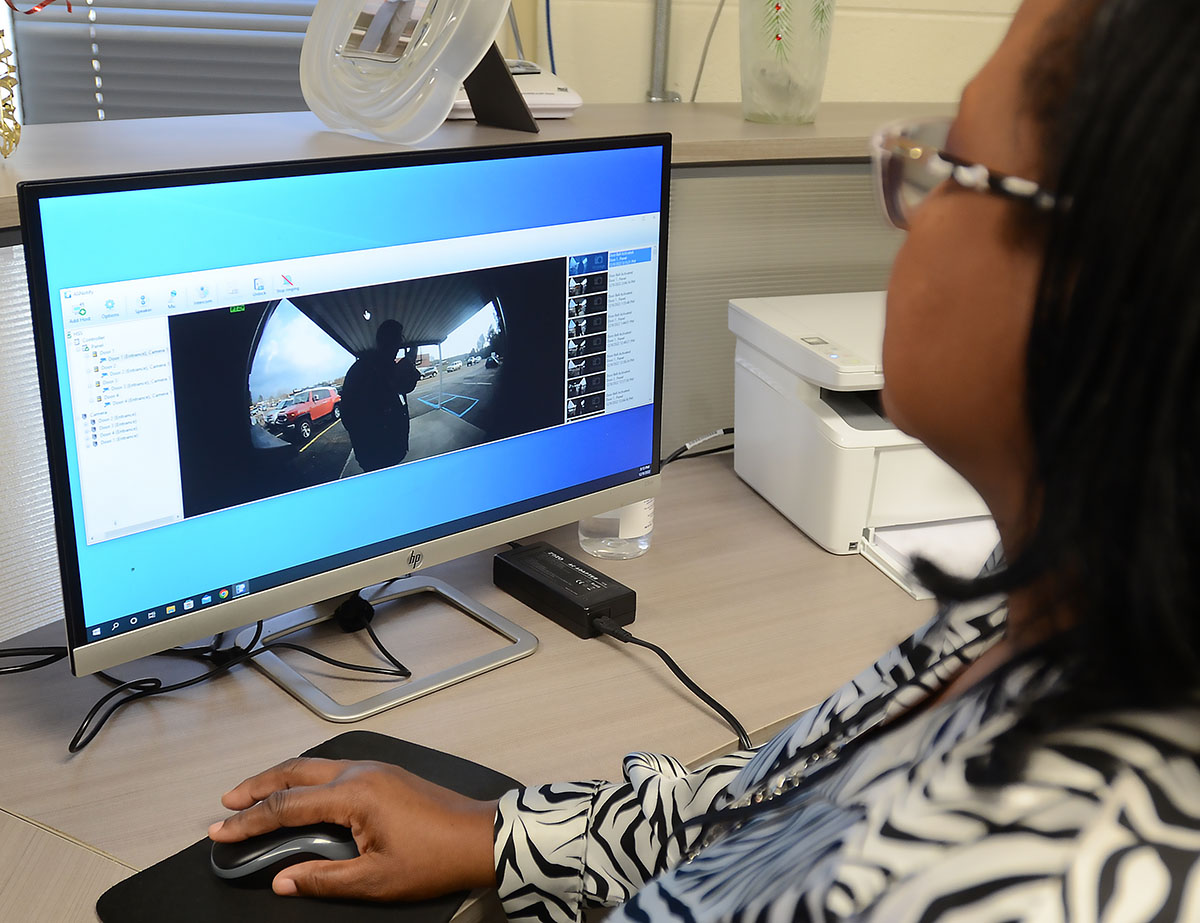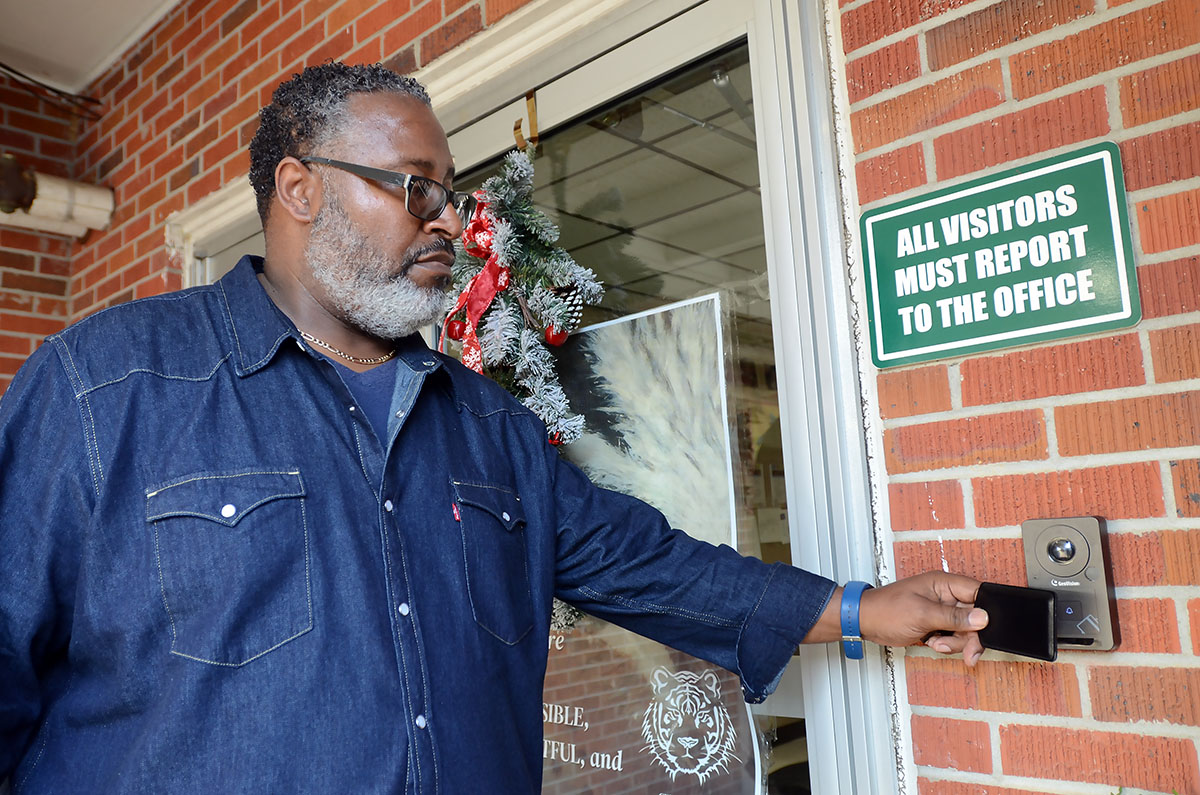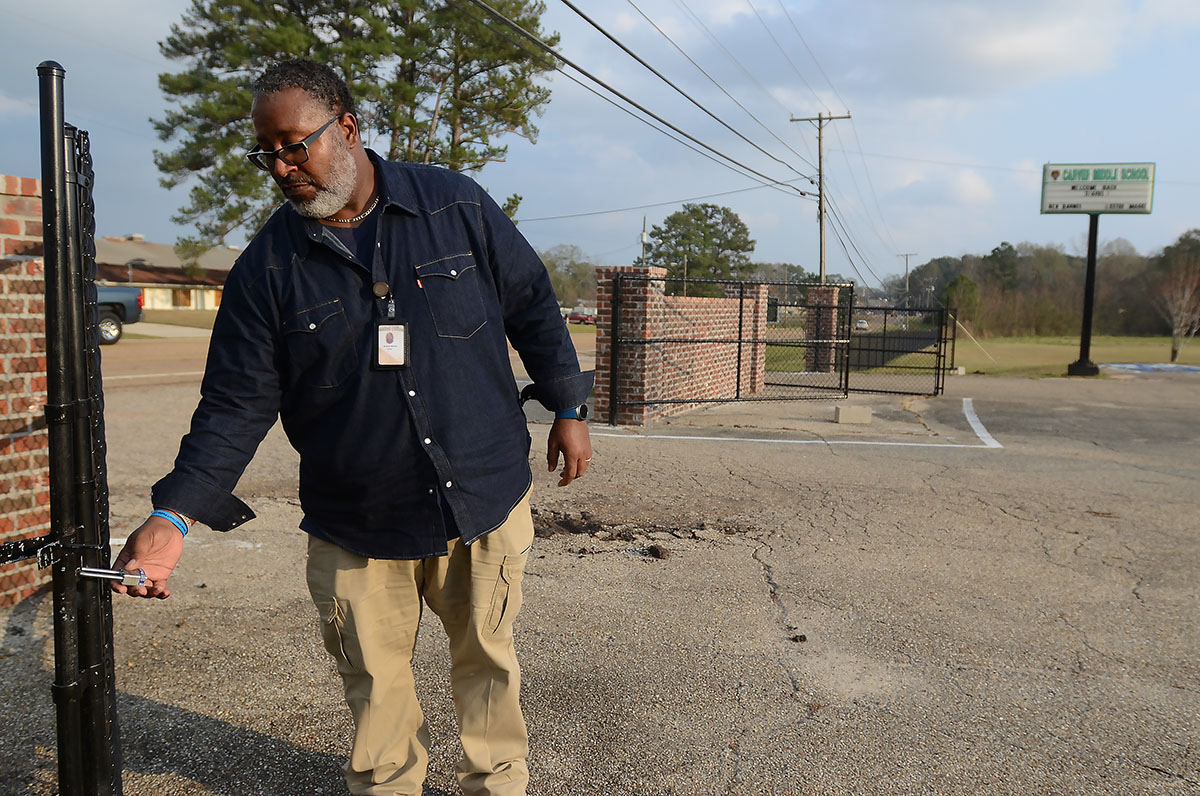Mississippi Today
How is Mississippi responding to the threat of school shootings?

How is Mississippi responding to the threat of school shootings?
Armed teachers, keycard locks, and lockdown buttons — these are just a few of the ideas and facility updates school districts are exploring as a way to protect campuses from the rising threat of school shootings.
School shootings have been on the rise nationally over the last decade, with 93 incidents in the 2020-2021 school year. Mississippi’s most notable school shooting occurred in 1997 at Pearl High School. More broadly, the Clarion Ledger reported there have been at least 25 incidents involving guns and students in Mississippi over the last 40 years.
Experts and school leaders interviewed by Mississippi Today agree that additional school resource officers are one of the best ways to respond to this threat, but acknowledge that without the funding to do so, arming educators could be a worthwhile secondary solution. At least nine states — Idaho, Florida, Kansas, Missouri, Oklahoma, South Dakota, Tennessee, Texas and Wyoming — have a provision or program for arming educators, a list that some in Mississippi hope to join.
A recent survey by Mississippi Professional Educators showed 64% of its members supported having properly trained educators or school staff respond to active shooter situations, a proposal that was also suggested by the governor in his recent legislative budget recommendations.
Gov. Tate Reeves proposed the creation of a “Mississippi School Safety Guardian Program” that would train and arm nominated school employees through the Department of Public Safety. The program was developed with recommendations and input from the newly formed School Safety Alliance.
Borne of concerns regarding student mental health and the frequency of school shootings, Mississippi Department of Education officials convened a group, launched in July of this year, to review existing school safety law and make recommendations for updates. The group consists of representatives from the Department of Public Safety, the Department of Homeland Security, the State Attorney General’s office, local school district employees and several advocates.
Earlier this year, the State Board of Education voted to update its weapons policy to conform with state law, which allows enhanced concealed carry permit holders to carry weapons on school campuses. Once the policy was adopted, MDE Director of Safe and Orderly Schools Brian McGairty said districts had concerns about the added liability of more guns on campuses and struggled to find an insurance carrier who would be willing to take it on, leading to discussions about creating a standardized guardian program.
READ MORE: Guns have been allowed in Mississippi schools (for some people) since 2012
While the training required to receive that enhanced permit is “very credibly issued,” McGairty said it “… doesn’t take into account that you may have rounds being fired back at you when you’re forced to make those decisions.”
“You may have moving targets that are not the offender coming towards you. When you have 25 kids running down a hallway, can you make that shot?” McGairty said.”
Erica Jones, president of the Mississippi Association of Educators, said teachers have voiced concerns about the training process and the possibility of the gun ending up in the wrong hands.
“Many of our educators do not want this added responsibility,” she said. “They feel as if they have enough duties as it is.”
For districts that opt-in to the potential guardian program, Public Safety Commissioner Sean Tindell is proposing a two-week training academy that specifically focuses on responding to active-shooter situations. The training will cover how to use firearms, self-defense, and communications training. The two week academy would also include background checks and mental health assessments, and the certification granted by this program would need to be reauthorized once a year.
Tindell said in the legislation his office is drafting, the firearms would be issued to school employees by DPS and would be standardized across the state, and the “guardians” would receive a $500 a month stipend. He added the department hopes the bill will have liability protections for districts and teachers in the case that an active shooter event does occur to help get buy-in from insurance companies.
READ MORE: School chiefs prepare for possibility of facing active shooter
Officials from the Department of Education and the Department of Public Safety agreed that having a school resource officer on every campus would be the best solution, but that sometimes the funding or local personnel may not exist to make that happen.
“I know some people are very wary of teachers carrying guns, but under the (policy) changes, they can do this anyway, and all we’re trying to do is provide an additional level of training … to give (districts) more comfort in the choice their making,” Tindell said.
Phillip Burchfield, Director of the Mississippi Association of School Superintendents, agreed that the guardian program could be a good substitute measure in districts that can’t get a school resource officer on every campus, but he is still concerned about the additional liability and stress it places on teachers. Burchfield also said he is not convinced the program is more cost effective than just hiring school resource officers once supplies, training time, and increased liability costs are factored in.
Some districts are also modifying their facilities to make them safer, should an active shooter event occur.
Fred Butcher, superintendent of the Natchez-Adams School District, said the district placed keycard locks on the exterior fencing at the newly renovated high school. Buildings were also renovated so that students don’t have to go outside as often to move between classrooms. The district has also added more cameras and created a lockdown feature that will shut down the campus in sections at the push of a button.
In Covington County, a federal grant allowed the district to install an access control system, which placed keycard locks on exterior doors, and cameras similar to Ring doorbells that secretaries can use to buzz in parents. Only staff have the keycards to open exterior doors from the outside, but a motion sensor on the inside of the door unlocks it for any person exiting.
“You don’t want to ever have a situation where a school is not welcoming, so it’s a really fine line and a balancing act,” said Superintendent Babette Duty.
Duty said she prefers school resource officers to the guardian program — she hired two more resource officers when she first became superintendent, and she would like to add more to ensure there’s one on every school campus.
“If you fully fund (the Mississippi Adequate Education Program), I can make decisions to keep our kids safe without somebody having to have a pistol,” she said.
“That person chose law enforcement. That is their field and that’s their skill set, and so that’s the person that I feel most confident about carrying a gun on campus rather than an educator.”
This article first appeared on Mississippi Today and is republished here under a Creative Commons license.
Mississippi Today
1964: Mississippi Freedom Democratic Party was formed
April 26, 1964

Civil rights activists started the Mississippi Freedom Democratic Party to challenge the state’s all-white regular delegation to the Democratic National Convention.
The regulars had already adopted this resolution: “We oppose, condemn and deplore the Civil Rights Act of 1964 … We believe in separation of the races in all phases of our society. It is our belief that the separation of the races is necessary for the peace and tranquility of all the people of Mississippi, and the continuing good relationship which has existed over the years.”
In reality, Black Mississippians had been victims of intimidation, harassment and violence for daring to try and vote as well as laws passed to disenfranchise them. As a result, by 1964, only 6% of Black Mississippians were permitted to vote. A year earlier, activists had run a mock election in which thousands of Black Mississippians showed they would vote if given an opportunity.
In August 1964, the Freedom Party decided to challenge the all-white delegation, saying they had been illegally elected in a segregated process and had no intention of supporting President Lyndon B. Johnson in the November election.
The prediction proved true, with white Mississippi Democrats overwhelmingly supporting Republican candidate Barry Goldwater, who opposed the Civil Rights Act. While the activists fell short of replacing the regulars, their courageous stand led to changes in both parties.
This article first appeared on Mississippi Today and is republished here under a Creative Commons Attribution-NoDerivatives 4.0 International License.![]()
Mississippi Today
Mississippi River flooding Vicksburg, expected to crest on Monday
Warren County Emergency Management Director John Elfer said Friday floodwaters from the Mississippi River, which have reached homes in and around Vicksburg, will likely persist until early May. Elfer estimated there areabout 15 to 20 roads underwater in the area.
“We’re about half a foot (on the river gauge) from a major flood,” he said. “But we don’t think it’s going to be like in 2011, so we can kind of manage this.”
The National Weather projects the river to crest at 49.5 feet on Monday, making it the highest peak at the Vicksburg gauge since 2020. Elfer said some residents in north Vicksburg — including at the Ford Subdivision as well as near Chickasaw Road and Hutson Street — are having to take boats to get home, adding that those who live on the unprotected side of the levee are generally prepared for flooding.



“There are a few (inundated homes), but we’ve mitigated a lot of them,” he said. “Some of the structures have been torn down or raised. There are a few people that still live on the wet side of the levee, but they kind of know what to expect. So we’re not too concerned with that.”
The river first reached flood stage in the city — 43 feet — on April 14. State officials closed Highway 465, which connects the Eagle Lake community just north of Vicksburg to Highway 61, last Friday.

Elfer said the areas impacted are mostly residential and he didn’t believe any businesses have been affected, emphasizing that downtown Vicksburg is still safe for visitors. He said Warren County has worked with the U.S. Army Corps of Engineers and the Mississippi Emergency Management Agency to secure pumps and barriers.
“Everybody thus far has been very cooperative,” he said. “We continue to tell people stay out of the flood areas, don’t drive around barricades and don’t drive around road close signs. Not only is it illegal, it’s dangerous.”
NWS projects the river to stay at flood stage in Vicksburg until May 6. The river reached its record crest of 57.1 feet in 2011.




This article first appeared on Mississippi Today and is republished here under a Creative Commons Attribution-NoDerivatives 4.0 International License.![]()
Mississippi Today
With domestic violence law, victims ‘will be a number with a purpose,’ mother says
Joslin Napier. Carlos Collins. Bailey Mae Reed.
They are among Mississippi domestic violence homicide victims whose family members carried their photos as the governor signed a bill that will establish a board to study such deaths and how to prevent them.
Tara Gandy, who lost her daughter Napier in Waynesboro in 2022, said it’s a moment she plans to tell her 5-year-old grandson about when he is old enough. Napier’s presence, in spirit, at the bill signing can be another way for her grandson to feel proud of his mother.
“(The board) will allow for my daughter and those who have already lost their lives to domestic violence … to no longer be just a number,” Gandy said. “They will be a number with a purpose.”
Family members at the April 15 private bill signing included Ashla Hudson, whose son Collins, died last year in Jackson. Grandparents Mary and Charles Reed and brother Colby Kernell attended the event in honor of Bailey Mae Reed, who died in Oxford in 2023.
Joining them were staff and board members from the Mississippi Coalition Against Domestic Violence, the statewide group that supports shelters and advocated for the passage of Senate Bill 2886 to form a Domestic Violence Facility Review Board.
The law will go into effect July 1, and the coalition hopes to partner with elected officials who will make recommendations for members to serve on the board. The coalition wants to see appointees who have frontline experience with domestic violence survivors, said Luis Montgomery, public policy specialist for the coalition.
A spokesperson from Gov. Tate Reeves’ office did not respond to a request for comment Friday.
Establishment of the board would make Mississippi the 45th state to review domestic violence fatalities.
Montgomery has worked on passing a review board bill since December 2023. After an unsuccessful effort in 2024, the coalition worked to build support and educate people about the need for such a board.
In the recent legislative session, there were House and Senate versions of the bill that unanimously passed their respective chambers. Authors of the bills are from both political parties.
The review board is tasked with reviewing a variety of documents to learn about the lead up and circumstances in which people died in domestic violence-related fatalities, near fatalities and suicides – records that can include police records, court documents, medical records and more.
From each review, trends will emerge and that information can be used for the board to make recommendations to lawmakers about how to prevent domestic violence deaths.
“This is coming at a really great time because we can really get proactive,” Montgomery said.
Without a board and data collection, advocates say it is difficult to know how many people have died or been injured in domestic-violence related incidents.
A Mississippi Today analysis found at least 300 people, including victims, abusers and collateral victims, died from domestic violence between 2020 and 2024. That analysis came from reviewing local news stories, the Gun Violence Archive, the National Gun Violence Memorial, law enforcement reports and court documents.
Some recent cases the board could review are the deaths of Collins, Napier and Reed.
In court records, prosecutors wrote that Napier, 24, faced increased violence after ending a relationship with Chance Fabian Jones. She took action, including purchasing a firearm and filing for a protective order against Jones.
Jones’s trial is set for May 12 in Wayne County. His indictment for capital murder came on the first anniversary of her death, according to court records.
Collins, 25, worked as a nurse and was from Yazoo City. His ex-boyfriend Marcus Johnson has been indicted for capital murder and shooting into Collins’ apartment. Family members say Collins had filed several restraining orders against Johnson.
Johnson was denied bond and remains in jail. His trial is scheduled for July 28 in Hinds County.
He was a Jackson police officer for eight months in 2013. Johnson was separated from the department pending disciplinary action leading up to immediate termination, but he resigned before he was fired, Jackson police confirmed to local media.
Reed, 21, was born and raised in Michigan and moved to Water Valley to live with her grandparents and help care for her cousin, according to her obituary.
Kylan Jacques Phillips was charged with first degree murder for beating Reed, according to court records. In February, the court ordered him to undergo a mental evaluation to determine if he is competent to stand trial, according to court documents.
At the bill signing, Gandy said it was bittersweet and an honor to meet the families of other domestic violence homicide victims.
“We were there knowing we are not alone, we can travel this road together and hopefully find ways to prevent and bring more awareness about domestic violence,” she said.
This article first appeared on Mississippi Today and is republished here under a Creative Commons Attribution-NoDerivatives 4.0 International License.
-

 News from the South - Florida News Feed6 days ago
News from the South - Florida News Feed6 days agoJim talks with Rep. Robert Andrade about his investigation into the Hope Florida Foundation
-

 News from the South - Alabama News Feed5 days ago
News from the South - Alabama News Feed5 days agoPrayer Vigil Held for Ronald Dumas Jr., Family Continues to Pray for His Return | April 21, 2025 | N
-

 Mississippi Today6 days ago
Mississippi Today6 days ago‘Trainwreck on the horizon’: The costly pains of Mississippi’s small water and sewer systems
-

 News from the South - Florida News Feed5 days ago
News from the South - Florida News Feed5 days agoTrump touts manufacturing while undercutting state efforts to help factories
-

 News from the South - Texas News Feed5 days ago
News from the South - Texas News Feed5 days agoMeteorologist Chita Craft is tracking a Severe Thunderstorm Warning that's in effect now
-

 News from the South - Oklahoma News Feed5 days ago
News from the South - Oklahoma News Feed5 days agoOklahoma Treasurer’s Office Faces Scrutiny Over Use of Signal in Anti-ESG Coordination
-

 News from the South - Virginia News Feed5 days ago
News from the South - Virginia News Feed5 days agoTaking video of military bases using drones could be outlawed | Virginia
-

 News from the South - Florida News Feed4 days ago
News from the South - Florida News Feed4 days agoFederal report due on Lumbee Tribe of North Carolina’s path to recognition as a tribal nation


















































